Classic Studies on the Problem of Good and Evil (6 vols.)
Digital Logos Edition
Overview
Defining good and evil is the formative project of much art, philosophy, and science. Familiarity with the history of this discussion is crucial to understanding the moral and philosophical climate of the world today, and how to speak to it.
This collection is a window into an important time in this discussion. Respected sociologists, political scientists, and philosophers comment on how “good” has been defined and cultivated through history and in institutions from the family to the state—as well as how evil has been identified and avoided. Ranging from engaging dialogues to detailed philosophical treatises, these resources will add a wealth of information to your library on how humankind has dealt with suffering and defined good throughout history.
In the digital edition, Classic Studies on the Problem of Good and Evil is enhanced by amazing functionality. Scripture citations link directly to English translations, and important terms link to dictionaries, encyclopedias, and a wealth of other resources in your digital library. Perform powerful searches to find exactly what you’re looking for. Take the discussion with you using tablet and mobile apps. With Logos, the most efficient and comprehensive research tools are in one place, so you get the most out of your study.
Be sure to bid on Classic Studies on Ethics and Moral Philosophy (9 vols.).

Key Features
- Opens a window into nineteenth-century discussions of good and evil
- Includes contributions from respected sociologists, political scientists, and philosophers
- Presents resources ranging from engaging dialogues to detailed treatises
Product Details
- Title: Classic Studies on the Problem of Good and Evil
- Volumes: 6
- Pages: 2,102
- Resource Type: Monographs
- Topic: Moral Philosophy
Individual Titles
- The Problem of Evil: An Introduction to the Practical Sciences by Daniel Greenleaf Thompson
- Studies of Good and Evil: A Series of Essays upon Problems of Philosophy and of Life by Josiah Royce
- The Meaning of Good: A Dialogue by G. Lowes Dickinson
- The Problem of Evil by M. Ernest Naville
- The Theory of Good and Evil: A Treatise on Moral Philosophy, vol. 1 by Hastings Rashdall
- The Theory of Good and Evil: A Treatise on Moral Philosophy, vol. 2 by Hastings Rashdall
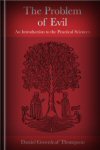
Considering all of human language, literature, science, thought, and action to be dominated by the opposing ideas of good and evil, Daniel Greenleaf Thompson embarks on a study to “fix more exactly and accurately the meanings of good and evil.” Thompson surveys how the problem of evil has been addressed in religious, political, and social institutions. This nineteenth-century study is a valuable resource for studying the philosophical climate at the turn of the century and provides thoughtful insights about the history of how humankind has sought to explain and eliminate evil.
Daniel Greenleaf Thompson (1850–1897) was a nineteenth-century philosopher who wrote several volumes on politics, literary theory, religious philosophy, psychology, and early sociology.
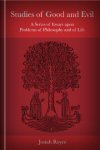
Josiah Royce, a major proponent of objective idealism, collects 12 of his essays on good and evil. As he investigates how good and evil have been discussed, Royce examines literary and historical cases such as Job, Pilgrim’s Progress, and the Sacramento Squatters’ Riot, as well as the work of Alfred Tennyson, Jean Marie Guyau and Meister Ekchart.
Josiah Royce (1855–1916) was an American objective idealist philosopher, professor, and writer. Born in California, he studied classics at the University of California, and philosophy at John Hopkins University, where he earned a PhD in 1878. He had a long career as philosophy professor and eventually department chair at Harvard University.
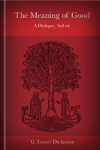
Reviving the ancient dialogue form, G. Lowes Dickinson presents a summary of various philosophies of what is good, “more desirous to set forth various points of view than finally to repudiate or endorse them.” Dickinson’s work provides a thorough understanding of each viewpoint.
G. Lowes Dickinson (1862–1932) was a British political scientist who was instrumental in the formation of the League of Nations following the World War I. He was a fellow of King’s College, Cambridge, and also wrote Letters from John Chinaman.
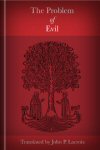
In every age, the problem of evil and suffering has been perceived as an obstacle to faith. Arguing against the view that “he who makes a free use of his understanding must necessarily reject Christianity,” M. Ernest Naville presents his solution to the problem of evil in religious philosophy. Naville’s treatise surveys the classic answers to the problem of good and evil, provides insight into the philosophical climate of the nineteenth century, and defends the orthodox Christian perspective on good and evil in the modern age.
M. Ernest Naville was a nineteenth century French moral philosopher.
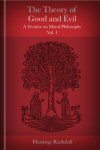
The meaning of good and evil is a central question in moral philosophy and ethics. Taking on the difficult task of condensing centuries of thought on this most complex of questions, Hastings Rashdall writes this introduction to what people have thought to be good and evil. No prior knowledge in the field is necessary, as Rashdall elegantly presents the arguments of a variety of classic texts in the field. The first volume includes the first book of Rashdall’s work, “The Moral Criterion.”
Hastings Rashdall (1858–1924) was a graduate and eventual fellow at New College, Oxford. His works include The Idea of Atonement in Christian Theology and The Universities of Europe in the Middle Ages.
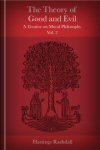
The meaning of good and evil is a central question in moral philosophy and ethics. Taking on the difficult task of condensing centuries of thought on this most complex of questions, Hastings Rashdall writes this introduction to what people have thought to be good and evil. No prior knowledge in the field is necessary, as Rashdall elegantly presents the arguments of a variety of classic texts in the field. This second volume features the Rashdall’s second and third books, “The Individual and the Society” and “Man and the Universe.”
Hastings Rashdall (1858–1924) was a graduate and fellow at New College, Oxford. His works include The Idea of Atonement in Christian Theology and The Universities of Europe in the Middle Ages.